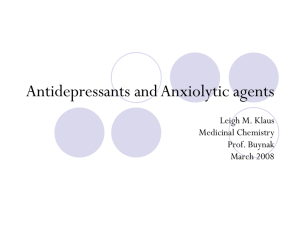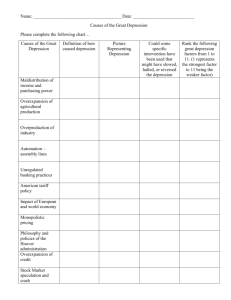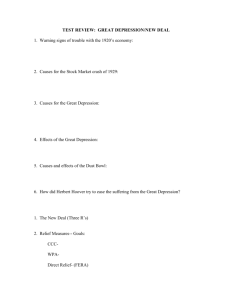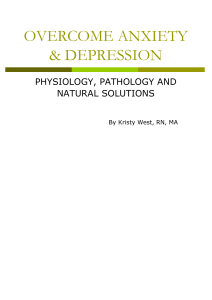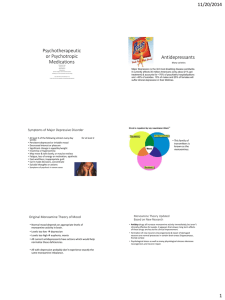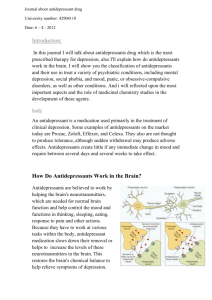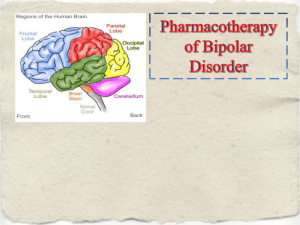Biological Therapies for depression: drugs
advertisement
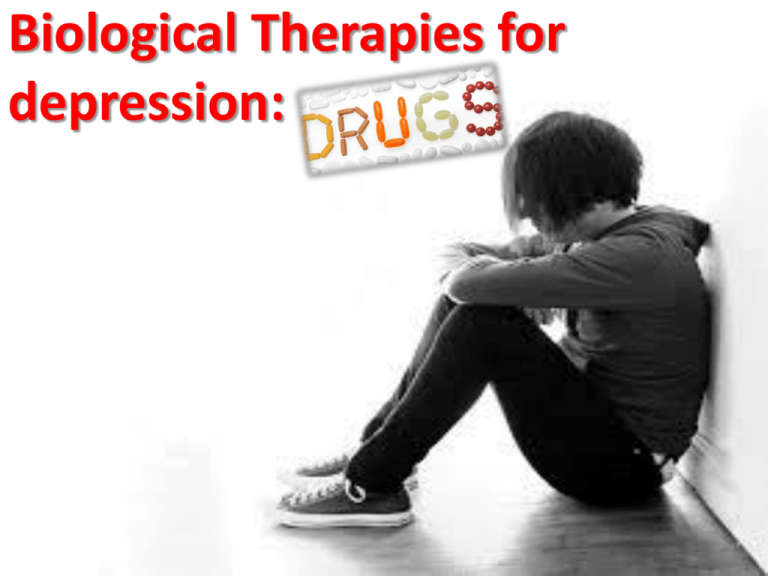
Biological Therapies for depression: By the end of the lesson you should be able to...... • Outline a biological treatment of depression (anti-depressants) • Evaluate the biological treatment of depression by focusing on their effectiveness (do they work?) and their appropriateness (should they be used for depression?) Biological therapies • Biological therapies have arisen from the biological approach that sees depression as a biochemical imbalance. • Antidepressants are designed to address this imbalance •Most widely used treatment for depression in NHS BIOLOGICAL TREATMENTS FOR DEPRESSION Their are 2 main Anti-Depressant medications …………. •Monoamine Oxidase Inhibitors (MAOIs)1950’s • Selective Serotonin Reuptake Inhibitors (SSRIs)- 1980’s “The wonder drug” BIOLOGICAL TREATMENTS FOR DEPRESSION Monoamine Oxidase Inhibitors (MAOIs) •Used as a treatment for tuberculosis, but doctors noticed it made patients happier. •Monoamine oxidase is an enzyme which breaks down monoamines (serotonin and noradrenalin) •MAOI’s Block the action of this enzyme •Thus, increasing the availability of these monoamines in the nervous system BIOLOGICAL TREATMENTS FOR DEPRESSION •Selective Serotonin Reuptake Inhibitors (SSRIs) •E.g. Prozac •Newer generation of drugs which focus purely on serotonin. •They block the re-uptake of serotonin in the synapse, making more available in the brain Evaluation of antidepressants as a treatment for depression Effectiveness of antidepressants • Gitlin (2002) carried out a clinical trial testing SSRI and placebo’s. • He found SSRI’s were effective in reducing symptoms of depression in around 75% of patients compared with 33% for placebos. 1. From these results what can we conclude about the effectiveness of SSRI’s and placebos? 2. Is Gitlin’s clinical trial strong evidence for the effectiveness of SSRI’s? Effectiveness of antidepressants • Read DeRubeis et al and Hollon’s et al (2005) research on SSRI’s and answer the following questions……….. 1) What did DeRubeis find from his clinical trail? 2) Why did Hollon carry out a follow up study on DeRubesis’s participants? 3) What did Hollon (2005) find? 4) What does his finding suggest about using drugs to treat depression? Effectiveness of antidepressants 2 types of treatments… • Curative treatments • Palliative treatments Many argue that drugs are just a palliative treatment as they treat the symptoms and not the cause of depression -most people relapse once they stop taking the drug. Are dugs appropriate to use as they have side effects? •Monoamine Oxidase Inhibitors (MAOIs) •Associated with potentially life threatening side effects such as stroke!! •Many of the foods consumed in a normal diet such as cheeses, certain fish, bananas, and some wines contain tyramine which reacts adversely with MAOI •People prescribed With MAOI’s must restrict their diet!!! •Recently introduced a MAOI in the form of a skin patch which allows slow continuous absorption of the drug into the nervous system BIOLOGICAL TREATMENTS FOR DEPRESSION • ANTI-DEPRESSANT MEDICATION • Selective Serotonin Reuptake Inhibitors (SSRIs) e.g., Prozac •Hailed a wonder drug in the 1980’s- most frequently prescribed, which has fewer side effects (nausea or headaches) and believed to be less dangerous in overdose BUT... Prozac has had some bad press… Answer the following questions…. 1. According to the article identify some dangerous side effects of Prozac. 2. What evidence is there that supports the idea that Prozac has serious side effects? 3. Are there any problems with this evidence? 4. Why is it a problem if drugs bring about side effects? 5. Is there any evidence that suggests Prozac is a safe drug with fewer side effects? H.W- Write a burger paragraph on the effectiveness of drugs or/and the appropriateness of drugs (referring to side effects) • Outline the problem. • Bring in evidence, what does the evidence suggest? • Why is this a problem-link back? • Why does this matter? Ethical issues •Take away sense of personal responsibility or control • people in severe depressive states may not be in a position to give fully informed consent Treating the symptoms not the cause Side effects • Serious effects on the body • Prozac= suicide Evaluation of antidepressant drugs • Short term relief• Symptoms re-occur after drugs are no longer taken • maintenance therapy- continue taking the drugs after improvement •Dependency/addiction Effective at reducing symptoms • Effective in treating symptoms 6575% of cases compared to only 33% for placebo (Gitlin 2002) Evaluation ..... • In order for therapy to be most effective we must combine drug therapy with psychological treatment.... • Patients must gain an insight into their disorder- in order for treatment to be effective.





